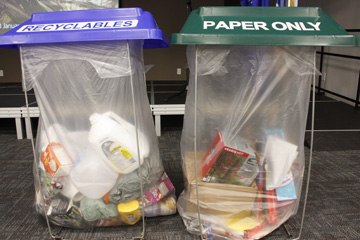Media Releases
Dual-stream recycling to be implemented
Dual-stream recycling is becoming a reality in the Town of Amherst.
Council approved the second reading on Feb. 26 of amendments to the town’s solid waste bylaw that will result in the town moving to a dual-stream collection of recyclable materials from a single-stream collection.
The move was necessitated by the destruction by fire of the recycling facility at the Little Forks Landfill last fall. The search to find an alternative site to take the area’s recyclables led to the discovery that Cumberland County was the only area in the province that used single-stream recycling. Moving to dual-stream recycling will also result in less contamination of recyclable materials.
recyclables led to the discovery that Cumberland County was the only area in the province that used single-stream recycling. Moving to dual-stream recycling will also result in less contamination of recyclable materials.
The switch was recommended by the Cumberland Joint Services Management Authority to all partners in the authority. Besides Amherst, that includes Oxford and Cumberland County. The other two jurisdictions have approved in principle the switch to dual-stream recycling, but have yet to give final approval.
The switch will mean all recyclables cannot be placed in the same clear plastic bag.
Now “container recyclables” – redeemable beverage containers; steel, tin or aluminum food containers and cans; glass food containers, jars and bottles; low-density polyethylene bags and packaging; high-density bags, containers and packaging; and polycoat containers for milk, milk products, soya milk, concentrates or other liquids or powders – must be put into one clear plastic bag than can be no smaller than 60 centimetres by 80 centimetres or larger than 100 centimetres by 150 centimetres. The weight of the bag shall not exceed 25 kilograms.
“Fibre recyclables” – corrugated cardboard, newsprint, catalogues, bond paper, glossy flyers and magazines, paper egg cartons, boxboard, computer paper, telephone and other soft-cover books – must be put into another clear plastic bag of the same dimensions and weight.
A maximum of six recycling bags per dwelling can be placed roadside per collection date. This is no different than before. Any combination of bags can be placed roadside provided they do not exceed the limit. As an example, a resident could place two bags of container recyclables and four bags of fibre recyclables at curbside and still be within the regulations.
The amendments do not affect the collection of garbage, also known as residual waste, or compostables.
The exact date for the implementation of the dual-stream recycling will be determined by the town in consultation with the Cumberland Joint Management Authority. They have indicated there will be an education period prior to the full implementation of the amended bylaw.
Miller Waste Systems Inc. awarded waste collection contract
In a related move, council also decided the same company that collected residential solid waste in Amherst for the past 5½ years will do so for the next five years.
Miller Waste Systems Inc. was awarded the new contract, which goes into effect on April 1.
The firm’s $1.3 million bid for the services chosen by council was the lowest of those submitted by the three bidders who responded to a request for proposals. The bid price represented 70 per cent of the scoring of the proposals, with the final scores being Miller 98, FERO Waste and Recycling Inc. 85 and GFL Environmental Inc. 69.
Like the old contract, the new one includes a three-stream collection service – garbage, organics and recyclable materials – a special yard waste collection each spring and fall as well as the weekly collection of organics during the summer.
In addition, the contract includes a new bi-weekly collection of one bulky item such as a mattress, washing machine or dryer.
Eliminated from the contract will be the springtime pick up of bulky items, Christmas trees and construction and demolition waste. The elimination of the latter two results in a savings of just over $93,000.
The spring collection of bulky items and construction and demolition waste will no longer be offered to apartment buildings, which are defined as buildings having four or more rental units.
It is estimated the new contract, combined with increased tipping fees charged by the Cumberland Joint Services Management Authority, will mean the residential solid waste charge will increase by about 10 per cent, although the final residential solid waste charge will be determined during the current budget process and must be approved by council before going into effect.
The Cumberland Joint Services Management Authority has indicated the residual tip free will increase to $215 per tonne from $175 per tonne, while there will be a $15 per tonne increase in the organics tip fee that will bring the fee to $90 per tonne.
